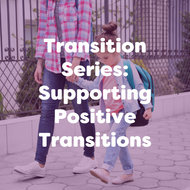Transition series 2: Supporting Positive Transitions
Posted by EYR Team on 20th Jun 2022
read more
This blog series has been written with the help of our EYR Industry experts over at the University of Cambridge, the University of Birmingham and Manchester Metropolitan University. With the input of these three experts as well as contributions from parents and practitioners, we bring you our transition blog series designed to provide you with unique insights, suggestions and solutions.
- Understanding Transitions
- Supporting Positive Transitions
- Getting School ready: a Parent's Advice
In our previous blog of this series we discussed the following three factors that play an influential role in children’s transition experience:
- Executive function
- Mind reading
- Attachment theory
In this blog, we will be delving back into these factors, providing suggestions and activity ideas to help your little ones develop in these three areas and ultimately, prepare them for positive transitions!
Executive Function
The mental processes that enable us to plan, focus attention, remember instructions and juggle multiple tasks successfully
Harvard University
Executive functions are malleable, and children's interactions with adults are an important context for developing executive functions. Parents can therefore both help and hinder the emergence of these skills.
Parents should aim to provide the "Goldilocks" level of support during goal-directed tasks - getting the balance right between letting children take the lead and ensuring that the task is not so difficult they get discouraged.
1. Have an old style birthday party
Traditional games like musical statues, Simon says etc give children lots of opportunities to practice self-control - and they learn quickly when they see each other getting it right!
2. Bake a cake
Baking is full of challenges for looking ahead - remembering what comes next and switching focus between tasks - will encourage children to think strategically in other scenarios
3. Use building blocks
Building with blocks is another great way to talk about having a plan, changing that plan by adding new elements, and keeping track of where you are in that plan.
4. Set silly challenges
Can children say "sausages" every time they want to say anything beginning with "S"? Or play the game of opposites, say "mine" instead of "yours", "up" instead of "down" etc.
Mind Reading
Day to day interactions with parents, caregivers and teachers can support children's ability to tune into what other people are thinking and feeling and there are various opportunities throughout the day to improve on these skills…
1. Explain yourself
Tuning into other people's minds involves recognising that thoughts and feelings guide our behaviour.
- Explain the reasons behind the rules e.g. tell me when you go outside otherwise I won't know where you are.
- Highlight differences and similarities e.g. I have to help Max more than you today because he missed last week's lesson.
- Avoid misunderstandings by explaining different points of view e.g. Anna didn't mean to take your lunch, she thought it was hers.
2. Talk about the past and the future
Discussions about recent events or a planned activity can provide an ideal opportunity to talk about thoughts, feelings and wishes.
- Ask about recent activities and upcoming events e.g. how do you feel about going to the park later?
- Compare your different points of view e.g. you're really excited about the park, how do you think I feel?
- Talk about how people can change their minds e.g. I used to hate broccoli when I was your age but now it's my favourite vegetable.
3. Go beyond the text when reading
Shared reading is a great way for children to talk about other people's thoughts, feelings and wishes.
- Ask about what the characters think and know e.g. does Red Riding hood know the wolf is in disguise?
- How they feel and why e.g. what would Red Riding feel if she knew it was the wolf?
- Compare the reader and character's point of view e.g. we know it's the wolf but Red Riding hood thinks it's her grandma.
Attachment theory
Attachment figures aren't simply individuals who spend a lot of time with the infant, they are typically the individuals who respond the most sensitively so bear this in mind!
- Think about how you can foster secure attachments between yourself and the children you care for.
- As a parent, try not to let your worries or concerns come across to your children. If they sense you are nervous about their new setting or teachers, they will adopt the same viewpoint.
- Remember the importance of predictability and stability - both of which are threatened at this time
- Try explaining a short term "plan" to a child and keep to that plan to help them feel safe and secure. If plans progress too quickly or change suddenly, the child could lose confidence and feel unsafe in the care of the adult.
Final factors to consider for positive transitions
- There is no "one size fits all" approach.
My best piece of advice is remembering that every child is unique! Remembering this while preparing children for positive transitions is the first step forward
Pre-school teacher
2. Relationships can be bridges to resilience
Focusing on parent partnership, keeping parents in the loop and involving them in all the transitional plans makes transition much smoother for all parties
Pre-school teacher
3. Plan, pace and play
Following and establishing routines helps as most children respond really well when they know and can anticipate what's happening now and what's happening later, it provides children with consistency which leads to positive behaviour and calmness
Pre-school teacher
4. Check the environment
The whole transition period can cause children a lot of anxiety as they experience a sense of lost control
Parent
Next in the series
Read the next instalment in our transition series Getting School Ready - A Parent's Advice here
Meet the experts
Dr Sarah Parry
Clinical Psychologist & Practice Fellow at Manchester Metropolitan University (@drSarahParry)
Dr Rory Devine
Lecturer in Developmental Psychology at the University of Birmingham
Professor Claire Hughes
Deputy Director, Centre for Family Research at the University of Cambridge





